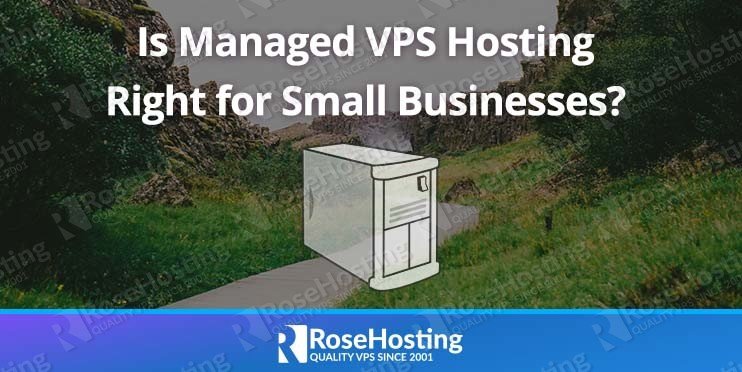In this post, we’ll be covering what to look out for when choosing a hosting provider, and why a managed VPS hosting provider is usually the best choice.

Table of Contents
Understanding Small Business Hosting Needs
Before you can think of choosing the right hosting provider, you need to figure out what your hosting requirements are. Hosting needs vary from business to business. In the case of small and mid-sized companies, a hosting service needs to be scalable. On the other hand, the server should be strong enough to handle unusual traffic spikes. Your day-to-day usage will also determine which hosting you should choose. Typically, a small business website needs the server for the following uses:
Storing Documents
Proper document storage is necessary for ensuring data protection and business continuity. Ideally, you’d have more storage so that there’s room to grow. In the event of a data disaster, a backup storage plan helps to recover crucial data.
Data backup
Your data is never safe if you keep it all in one location only. The physical location can suffer various man-made or natural disasters. The only way to prevent a massive data loss is to back up the data more frequently and keep several copies. A properly managed server can save and back up data in real-time to a remote location on a daily basis without causing any website lag, while some managed servers not only perform regular backups but also perform regular redundant backups, ensuring the maximum probability of your data surviving, no matter what happens.
Hosting Applications
If you host your apps on remote servers, you do not need to invest any additional money in setting up in-house hardware. Some of these common applications that you can rent through the cloud are CMS, CRM, ERP, invoice management, employee management apps, etc. All of these have extensive support and documentation, and your hosting provider should be able to help you out with any of those.
Hosting the company website
Want to increase the online visibility of your brand? You need a good company website first. Choosing the right hosting provider for your website is necessary to ensure optimum performance and efficiency. The hosting itself can also impact your website’s ranking in the SERPs (search engine results page).
Hosting an online store
Hosting is one of the most critical components of an online retail store. To build an eCommerce platform, you must get the best managed hosting. A good server ensures that your website loads fast and functions properly. It also keeps your customers’ sensitive information secure.
Securing email
Though you can use Yahoo or Gmail as your official business email in the initial days, you should get a domain-specific email as soon as you build your website. Even if you do not have a website at the moment, the domain-specific email address will make you look professional and distinguished. It will also increase your digital security and reputation.
Choosing from the popular options
Hosting services can be divided into two main categories — managed hosting and unmanaged hosting. Understanding what each of them means is crucial for businesses that are getting web hosting for the first time. Here’s a brief overview of each:
Managed hosting
Managed VPS (virtual private server) hosting is where you use the virtual servers from a hosting provider. You are the sole user of the virtual server, and you also get access to a ton of features. You will have full control over the server resources, security, operating system packages and software.
The best part is that since it is ‘fully managed’, you won’t have to worry about server management, administration, or support. The managed hosting provider will do that for you. This way, you do not need to hire any in-house support team or oversee the process yourself.
Unmanaged hosting
Unmanaged hosting, on the other hand, gives you access to the server and you have to manage all server tasks, like installation, configuration, updates, etc by yourself. You do not get any additional features with it. So you need to manage all aspects of the server on your own. Whether it is downloading or updating software/apps or fixing server issues, you have to do everything on your own.
Taking care of all these responsibilities is a full-time job. Moreover, you need to have in-depth technical knowledge to be able to handle it. You can hire Linux administrators to help you with these aspects, but bear in mind that building an in-house team will cost you more. Even without a team, knowledge is a mandatory part of using a server. If you don’t spend money on a team that is knowledgeable, then you’ll be spending time (and therefore money) on learning the administration yourself.
Unmanaged hosting is often cheaper than managed hosting. On the surface, it may look like the better choice as it helps you in cost-cutting. However, if you fail to manage it properly, your entire business process can suffer, causing major financial loss. That is why experts say that managed hosting is the ultimate choice for small businesses.
Fully managed VPS hosting benefits
As mentioned above, a fully managed hosting service is ideal for small businesses of all kinds. Despite having a slightly higher cost than unmanaged hosting, it is the more popular choice. That is because it offers a range of excellent benefits that far outweigh the cost premium.
Here are some of them:
- Server management – Servers need to be constantly managed, OS packages require regular updates, and security patches, websites, and apps installed on the server have to be scanned for malicious activities, errors, and potential failures on a regular basis. With managed hosting, you get a dedicated team of experienced admins who will do all of this for you. It is the best way to prevent hazardous circumstances in the future.
- Security – Given the increasing number of cyber attacks, it is necessary to safeguard your website against all kinds of threats. With a good managed hosting, you will get all the industry-leading, state-of-the-art security tools and features.
- Performance monitoring: When running a website, you need to make sure that it is highly functional. For this, you need to monitor performance every day. Most managed service providers will install and configure a monitoring service for you so that you can focus on other aspects of your business.
Running a small business is no easy task. Being an entrepreneur, you have to manage multiple things at once. Adding server management and maintenance to that may be a little overwhelming and complex. Getting a fully managed VPS hosting can solve this entirely.

